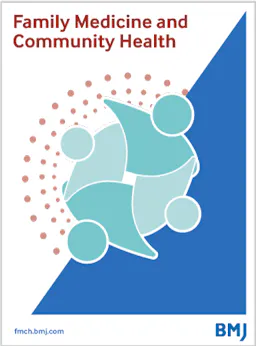Identifying bereaved grievers with greatest medical or social service needs in Japan
IF 2.6
3区 医学
Q1 PRIMARY HEALTH CARE
引用次数: 0
Abstract
Objective Severe grief adversely affects the health of bereaved families, potentially burdening medical and community health services. Interventions for effective community health maintenance must identify the people likely to face severe effects of bereavement. The present study identified characteristics of mourners who experience severe grief within a year of bereavement to confirm whether this grief increased their reliance on Japanese medical and social services. Design We conducted a nationwide postal survey of Japanese bereaved within the previous year, to compare those reporting daily or overwhelming ‘heavy’ grief to those with less heavy grief, in terms of demographic and socioeconomic details, daily work and non-work activity, frequency of medical and social service use. Setting/participants In 2019, with the support of the Ministry of Education and the All Japan Funeral Co-Operation, we distributed approximately 5500 questionnaires to Japanese who had presided at funerals within the past year for anonymous return. By January of 2020, we received 1078 complete voluntary responses from bereaved Japanese. Results Half of the ‘heavy grief’ group (n=143) reported adverse effects on health and daily life, including needs for pharmacological, medical or welfare support. Losses of husbands or children were particularly connected to severe grief; ‘unexpected’ death from cancer caused the greatest shock. Employment (even part-time) buffered against severe grief; grief was greater for the unemployed and substantially worse for those who lost significant income at the same time as they lost loved ones. Conclusion These findings suggest that prior counselling should reduce the shock of bereavement and economic loss, which increases subsequent medical dependence. Medical professionals and community health workers can use the above factors to target in advance the family members in greatest danger of heavy grief, to intervene lest grief adversely affect their physical and psychological health after bereavement.确定日本最需要医疗或社会服务的丧亲者
目的严重的悲痛会影响丧亲家庭的健康,给医疗和社区卫生服务带来潜在的负担。有效的社区卫生维护干预措施必须确定可能面临丧亲之痛严重影响的人群。目前的研究确定了在丧亲一年内经历严重悲伤的哀悼者的特征,以确认这种悲伤是否增加了他们对日本医疗和社会服务的依赖。设计我们在前一年对日本的丧亲者进行了一次全国范围的邮政调查,比较那些每天或极度悲伤的人与那些悲伤程度较轻的人,在人口和社会经济细节、日常工作和非工作活动、医疗和社会服务使用频率等方面。2019年,在文部科学省和全日本殡葬合作组织的支持下,我们向过去一年内主持过葬礼的日本人发放了约5500份问卷,并进行了匿名返还。截至2020年1月,我们收到了1078份来自日本丧亲者的完整自愿回复。结果:“重度悲伤”组中有一半(n=143)报告了对健康和日常生活的不良影响,包括需要药物、医疗或福利支持。失去丈夫或孩子尤其与极度悲伤有关;癌症的“意外”死亡引起了最大的震惊。就业(即使是兼职)缓解了严重的悲伤;失业者的悲伤更大,而那些在失去亲人的同时失去大量收入的人的悲伤更大。结论事先咨询可以减少因丧亲之痛和经济损失带来的冲击,从而增加后续的医疗依赖。医疗专业人员和社区卫生工作者可以利用上述因素,提前针对重度悲伤危险最大的家庭成员进行干预,以免悲伤对其丧亲后的身心健康产生不利影响。
本文章由计算机程序翻译,如有差异,请以英文原文为准。
求助全文
约1分钟内获得全文
求助全文
来源期刊

Family Medicine and Community Health
PRIMARY HEALTH CARE-
CiteScore
9.70
自引率
0.00%
发文量
27
审稿时长
19 weeks
期刊介绍:
Family Medicine and Community Health (FMCH) is a peer-reviewed, open-access journal focusing on the topics of family medicine, general practice and community health. FMCH strives to be a leading international journal that promotes ‘Health Care for All’ through disseminating novel knowledge and best practices in primary care, family medicine, and community health. FMCH publishes original research, review, methodology, commentary, reflection, and case-study from the lens of population health. FMCH’s Asian Focus section features reports of family medicine development in the Asia-pacific region. FMCH aims to be an exemplary forum for the timely communication of medical knowledge and skills with the goal of promoting improved health care through the practice of family and community-based medicine globally. FMCH aims to serve a diverse audience including researchers, educators, policymakers and leaders of family medicine and community health. We also aim to provide content relevant for researchers working on population health, epidemiology, public policy, disease control and management, preventative medicine and disease burden. FMCH does not impose any article processing charges (APC) or submission charges.
 求助内容:
求助内容: 应助结果提醒方式:
应助结果提醒方式:


